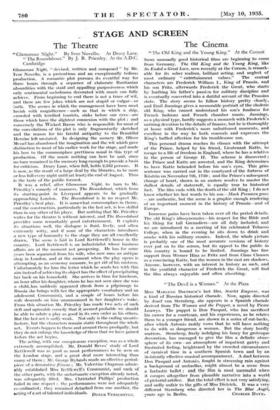STAGE AND SCREEN
The Theatre "Glamorous Night." By Ivor Novello. At Drury Lane. "The Roundabout." By J. B. Priestley. At the A.D.C.
Cambridge . •
Glamorous Night, "devised, written and composed" by Mr. Ivor Novello, is a pretentious and an exceptionally tedious production. A romantic plot pursues. its eventful way for three hours through a sequence of elaborate Ruritanian absurdities with the staid and appalling purposiveness which only sentimental melodrama decorated with music can fully achieve. From beginning to end there is not a trace of wit, and there are few jokes which are not stupid or vulgar—or both. The scenes in which the management have been most lavish with magnificence—such as that in which a ship, crowded with terrified tourists, sinks before our eyes—are those which have the slightest connexion with the plot : and conversely the Wicked Baron who is responsible for most of the convolutions of the plot is only fragmentarily sketched and the reason for his fateful antipathy to the Beautiful Heroine left unstated. In designing the scenery Mr. Oliver Messel has abandoned the imagination and the wit which gave distinction to most of his earlier work for the stage, and made his bow to the commonplace prettiness usual in this type of production. Of the music nothing can here be said, since no tune remained in the memory long enough to provide a basis for criticism. Drury Lane, when full, holds 2,332 persons. It is now, as the result of a large deal by the libraries, to be more or less full every night until (at least) the end of August. Thus is the taste of the public formed.
It was a relief, after Glamorous Night, to turn to Mr. Priestley's comedy of manners, The Roundabout, which from its starting-point in Liverpool appears to be gradually approaching London. The Roundabout is in no respect Mr. Priestley's best play. It is somewhat commonplace in theme, and the construction, particularly in the last act, is less skilful than in any other of his plays. But nothing that Mr. Priestley writes for the theatre is without interest, and The Roundabout provides some remarkably good entertainment. It exploits its situations well, the dialogue is fluid, lively, and often extremely witty, and if none of the characters introduces a new type of hunianity to the stage they arc all excellently drawn. The scene is laid. in.Lord Kettlewell's house in the country. Lord Kettlewell is an industrialist whose business affairs are at the moment not prospering. He has for some years been separated from his wife, who now runs an antique shop in London, and at the moment when the play opens is attempting, as an economy measure, to get rid of his mistress. Unfortunately for him the letter Which he sends her with this aim instead of achieving its object has the effect of precipitating her back on his household. She arrives in time for luncheon, an hour after his daughter, whom he has not seen since she was a child, has suddenly appeared (fresh from a pilgrimage to Russia she brings with her the appropriate vocabulary and an adolescent Communist), and a couple of hours before his wife descends on him unannounced in her daughter's wake. From this situation Mr. Priestley has made two acts of such deft and agreeable comedy that it seemed probable we should be able to salute a play as good in its own order as his others. But the last act is sadly weak. Not only is the ending unsatis- factory, but the characters remain static throughout the whole act. Events happen to them and around them prodigally, but they do not enlarge the knowledge of them that we have gained before the act begins.
The acting, with one conspicuous exception, was as a whole extremely accomplished. Mr. Donald Beves' study of Lord Kettlewell was as good as most performances to be seen on the London stage, and a great deal more interesting than many of them ;, Mr. George Rylands made an effective period- piece of a decorative ildncur ; Mr. Valentine Chapman admir- ably established Miss liettlewell's Communist, " and each of the other parts, with the unfortunate exception already noted, was adequately filled. Mrs. Christabel Phillips: production failed in one respect : the performances were not adequately co-ordinated; they remained detacheil from one another, the acting of a set of talented individuals. D X7 EREH ERSCHOYLE.


































































 Previous page
Previous page